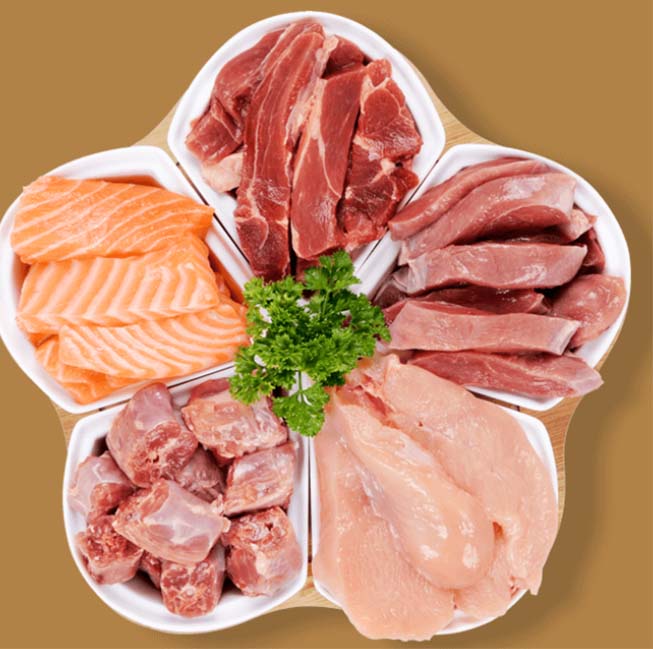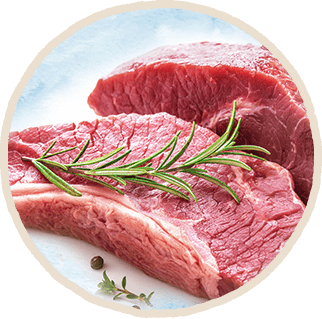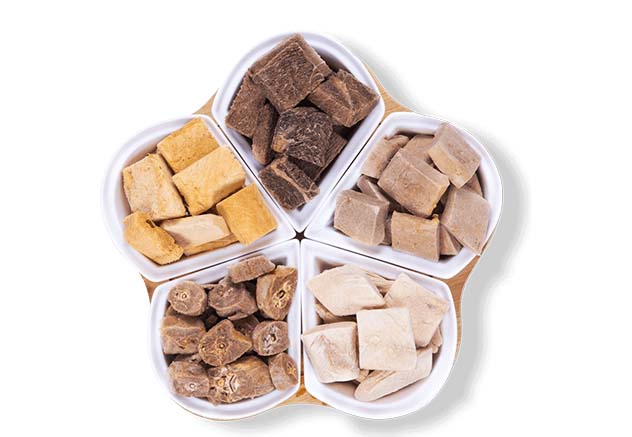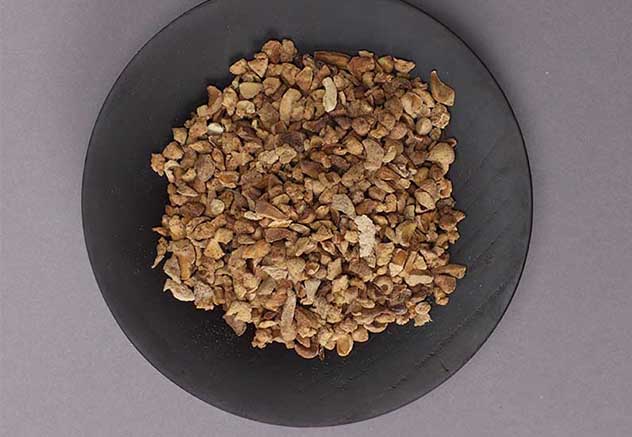Compared with lean muscle, organ meat is richer in important nutrients. In addition to high-quality protein and fat, offal is also rich in vitamins A, B, D, E, and important minerals such as iron, phosphorus, selenium, and zinc.
Organ meat is usually understood as the internal organs of larger livestock (such as cattle or sheep). In addition, the hearts and livers of poultry such as chickens, ducks or turkeys are also considered suitable organs for feeding dogs.

Freeze dried organ meat for dogs is one of the most nutritious foods you can give your dog. In fact, the internal organs contain more vitamins, minerals, and other valuable nutrients than muscles. In addition to high-quality protein and fat, offal meat is also rich in vitamins A, B, D, and E, as well as minerals such as copper, iron, phosphorus, selenium, and zinc. All of these are vital to the health of the dog.
Protein is an essential nutrient for dogs. It has many functions in the body, such as muscle growth, tissue repair, enzymes, oxygen transport in the blood, and immune function. Protein is also an important source of energy.
Protein is made of amino acids. There are essential and non-essential amino acids. The dog's body cannot produce essential amino acids. These amino acids must be provided through diet. Dogs produce sufficient amounts of non-essential amino acids and usually do not need to be supplemented by diet.
Fat plays an important role in dog nutrition. It is an extremely dense energy source. Compared with protein and carbohydrates, fat contains about 2.25 times the calories per gram. Fat is also a source of essential fatty acids. Essential fatty acids can promote brain development in puppies, strengthen the dog’s immune system, reduce inflammation, enhance anti-cancer ability, support heart health, and support many other aspects of dog health.
Vitamins are classified as either fat-soluble (vitamins A, D, E, K) or water-soluble (vitamins B and C). Water-soluble vitamins are essential in the metabolism of proteins, carbohydrates and fats, the latter providing energy for the growth process. Unlike fat-soluble vitamins, water-soluble vitamins are not stored in the body and must be consumed daily. Fat-soluble vitamins are important for bone shape and the dog's vision.
Minerals are essential for many different functions of the human body, such as the formation of bones and cartilage, enzymatic reactions, maintenance of fluid balance, the transport of oxygen in the blood, normal muscle and nerve function, and hormone production.
Minerals are generally divided into minerals (calcium, phosphorus, sodium, chlorine, potassium, magnesium) and trace minerals (iron, zinc, copper, manganese, selenium, iodine). There are more minerals found in dogs than trace minerals. Dogs also need more minerals than trace minerals as part of their diet.

Dogs can eat all animal organs as long as they come from healthy and well-raised animals. Include:
Reproductive Organs (Testes, Uterus)
Brain
Spleen
Kidneys
Liver
Lungs
Heart
Trachea
Spleen
Eyeballs
Brain
Sweet Bread (Pancreas and Thymus)
Tongue
Ideally, dogs should eat regularly to obtain all of the above-mentioned organs. At the same time, it is understandable that not everyone is suitable for filling the refrigerator with brains and eyeballs. However, because organ meat is very rich in nutrients, you only need to add some of the more common organs to enhance your dog's diet.
| Brain | Heart | Kidney | Liver | Lung | Spleen | Tongue | Tenderloin | |
| Vitamin A [IU] | 147 | 0.00 | 1,397 | 16,898 | 46.0 | 0.00 | 0.00 | 0.00 |
| Thiamin [mg] | 0.09 | 0.24 | 0.36 | 1.89 | 0.05 | 0.05 | 0.13 | 0.12 |
| Riboflavin [mg] | 0.20 | 0.91 | 2.84 | 2.76 | 0.23 | 0.37 | 0.34 | 0.21 |
| Niacin [mg] | 3.55 | 7.35 | 8.03 | 13.18 | 4.00 | 8.40 | 4.24 | 2.99 |
| Pantothenic Acid [mg] | 2.01 | 1.79 | 3.97 | 7.17 | 1.00 | 1.08 | 0.65 | 0.30 |
| Vitamin B6 [mg] | 0.23 | 0.28 | 0.67 | 1.08 | 0.04 | 0.07 | 0.31 | 0.38 |
| Folate [mcg] | 3.00 | 3.00 | 98.0 | 290 | 11.0 | 4.00 | 7.00 | 6.00 |
| Vitamin B12 [mcg] | 9.51 | 8.55 | 27.5 | 59.3 | 3.81 | 5.68 | 3.79 | 2.60 |
| Vitamin D [IU] | n.a. | n.a. | 45.0 | 49.0 | n.a. | n.a. | n.a. | n.a. |
| Vitamin E [mg] | 0.99 | 0.22 | 0.22 | 0.38 | n.a. | n.a. | n.a. | n.a. |
| Vitamin K [mcg] | 0.00 | 0.00 | 0.00 | 3.1 | n.a. | n.a. | n.a. | n.a. |
As you can see, each organ provides its own unique set of minerals and vitamins. The more organs you add to your dog's diet, the better the nutrients the dog receives.
| Brain | Heart | Kidney | Liver | Lung | Spleen | Tongue | Tenderloin | |
| Calcium [mg] | 43.0 | 7.00 | 13.0 | 5.00 | 10.0 | 9.00 | 6.00 | 7.00 |
| Copper [mg] | 0.29 | 0.40 | 0.43 | 9.76 | 0.26 | 0.17 | 0.17 | 0.09 |
| Iron [mg] | 2.55 | 4.31 | 4.60 | 4.90 | 7.95 | 44.6 | 2.95 | 2.35 |
| Magnesium [mg] | 13.0 | 21.0 | 17.0 | 18.0 | 14.0 | 22.0 | 16.0 | 20.0 |
| Manganese [mg] | 0.03 | 0.04 | 0.14 | 0.31 | 0.02 | 0.07 | 0.03 | 0.01 |
| Phosphorus [mg] | 362 | 212 | 257 | 387 | 224 | 296 | 133 | 181 |
| Potassium [mg] | 274 | 287 | 262 | 313 | 340 | 429 | 315 | 304 |
| Selenium [mcg] | 21.3 | 21.8 | 141 | 39.7 | 44.3 | 62.2 | 9.40 | 17.1 |
| Sodium [mg] | 126 | 98.0 | 182 | 69.0 | 198 | 85.0 | 69.0 | 49.0 |
| Zinc [mg] | 1.02 | 1.70 | 1.92 | 4.00 | 1.61 | 2.11 | 2.87 | 3.05 |
It is important to note that pasture-raised animals contain higher levels of essential nutrients than grain-raised animals.
Bovine lung is rich in protein, vitamin A, vitamin E, and enzymes related to immune function in the form of minerals such as zinc, selenium, copper, and manganese. These substances can improve the dog's immunity and enhance disease resistance. The content of iron trace element in the bovine lung is high and it is well absorbed. The freeze dried beef lung is rich in phosphorus, which forms bones and teeth, promotes growth and repairs body tissues and organs, provides energy and vitality, and participates in the regulation of acid-base balance.
A whole beef liver can weigh up to 30 pounds. ⁵The color of raw liver is reddish-brown and the texture is soft. The main task of the liver is to filter toxins from the blood, but it does not store pollutants.
Freeze dried beef liver treats are one of the highest sources of vitamin A in all foods. Vitamin A helps digestion, keeps reproductive organs healthy, and is a powerful antioxidant. Beef liver is also very rich in folic acid and vitamin B12, which are essential for the health of the nervous system. They help in the production of red blood cells. In addition, the liver is a rich source of trace minerals copper and iron. Both are essential for the transport of oxygen in the blood.

The easiest way to prepare organ meat for your dog is to consume Freeze-Dried Beef Powder. The type of organ meal given to the dog every day is not important. Instead, make some changes in the diet and make sure that your dog consumes enough offal meal within a week. If your dog has never eaten this type of food before, it is recommended to start with a small amount and gradually increase the amount until your dog is used to the new food. Freeze dried dog treats are very suitable for all kinds of dog training because of dogs like their smell and taste.

Just contact us now!
Ranova has obtained global recognition, such as FDA registration, EU registration, CFIA certification, ISO9001, ISO22000, BRC certification, BSCI certification, etc. Our advanced organ freeze-dried powder is made from only one ingredient-completely free of additives and preservatives. Is your ideal choice?
Organ meat is rich in important nutrients. In addition to high-quality protein and fat, the internal organs are also rich in vitamins, minerals and trace minerals. Organ meat accounts for 25% of the dog's total food intake. However, the content of any single organ must not exceed 10%. Ideally, raw organ meat can be consumed, and a more convenient option is to buy our products directly.
